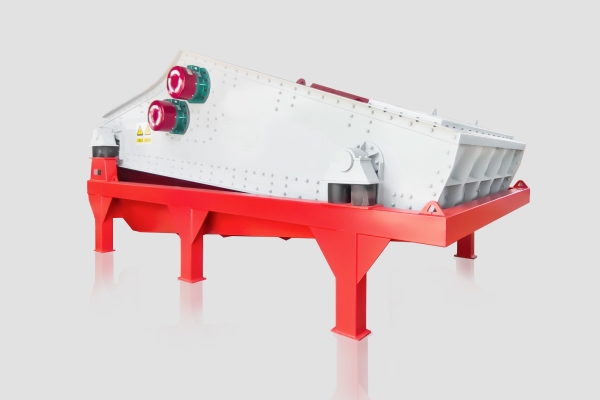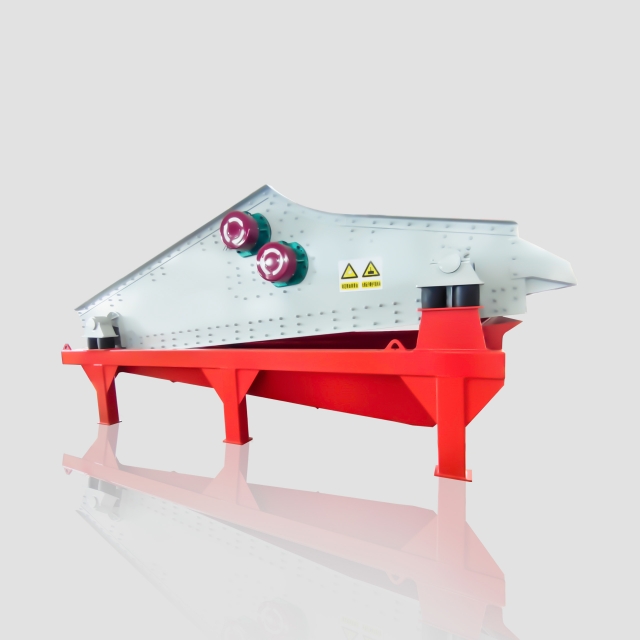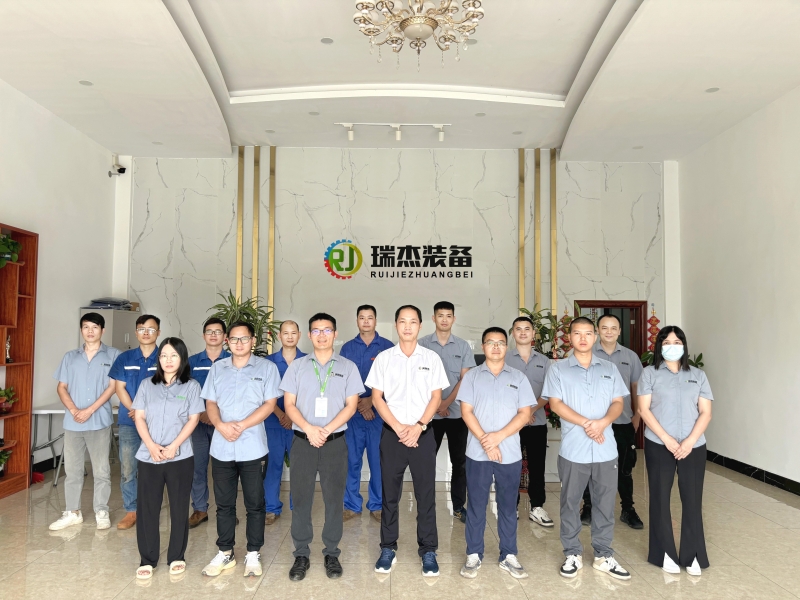High-Capacity Dewatering Vibrating Screen China Manufacturer & Supplier
RUIJIE’s dewatering vibrating screen is designed for high-capacity performance, ensuring efficient separation of water from solids. The screen handles large volumes of material, making it ideal for industries like mining, construction, and wastewater treatment. With advanced technology and robust design, it enhances material processing and reduces moisture content effectively.
Features of Vibrating Screen Machine
- The eccentric block integrated vibrating motor is adopted, which further improves the screening efficiency and ensures the quality of the product.
- Equipped with a highly wear-resistant and anti-clogging polyurethane screen, this screen has a high degree of modularity and is easy to replace.
- The connecting part is riveted with special high-strength ring groove rivets for vibrating screens, which avoids accidents such as side plate cracking caused by welding defects.
- The use of low-alloy structural steel plate (Q345R) enables the equipment to maintain its overall stiffness in cold areas of -40°C
Dewatering Vibrating Screen Series From RUIJIE
A dewatering vibrating screen is a type of industrial equipment used to separate water from solids in various materials. It uses high-frequency vibrations to help accelerate the removal of water or other liquids from wet materials. The screening machine is typically equipped with a mesh that allows liquid to pass through while retaining the solids.
In operation, the material is fed onto the vibrating screen, which causes the particles to move across the screen’s surface. The liquid drains through the mesh, leaving the solids behind. This process is particularly useful in industries such as mining, construction, and wastewater treatment, where separating water from materials is essential. The result is drier, more manageable solids that are easier to handle or process further.
RUIJIE offers custom options based on customers’ specific needs, providing a versatile solution for various screening applications. Our vibrating screens can be used for sand washing in sand and gravel plants, slime recovery in coal preparation plants, dry discharge of tailings in mineral processing plants, etc.
Request a Quote Today for Your Vibratory Screening and Dewatering Needs
Looking for a high-performance solution for material dewatering and screening? RUIJIE vibrating dewatering screens are engineered to deliver efficient moisture removal, making them ideal for sand washing, incineration bottom ash treatment, and aggregate processing.
Our equipment is built for durability, ensuring long-term reliability with minimal maintenance. Designed for maximum efficiency, RUIJIE dewatering screens help optimize your production process, improve material quality, and reduce operational costs.
Get in touch today for a free quote and let our experts assist you in finding the perfect screening solution for your needs!
What Are the Advantages of Vibrating Screens?
Vibrating screens offer several benefits in material processing. They efficiently separate solids from liquids, reducing drying time. Their continuous operation increases productivity with minimal manual effort. These screens handle various materials, from fine sand to large aggregates, making them versatile for different industries. The adjustable vibration settings allow customization based on material type. Their simple design reduces maintenance costs while ensuring consistent performance. With improved efficiency and durability, vibrating screens are a reliable choice for dewatering and material separation.
Why Choose RUIJIE’S Dewatering Vibrating Screen?
Enhanced Screening Efficiency: The eccentric block integrated vibrating motor generates stronger vibrations, improving the screening speed and efficiency. Materials move more evenly across the screen, ensuring quick dewatering and reducing processing time.
Durable, High-Quality Materials: Made with high-strength low-alloy structural steel (Q345R), the equipment is built to withstand long-term, heavy-duty use. It maintains excellent performance even in extreme temperatures, ensuring reliability in tough conditions.
Reliable and Safe Connections: The use of high-strength ring groove rivets for connections eliminates the risk of defects like side plate cracking that can occur with welding. This design enhances the overall structural integrity and ensures the machine’s safety during operation.
Easy Maintenance and Part Replacement: The polyurethane screens are designed with a modular structure, allowing for easy and quick replacement. This reduces downtime and maintenance costs, ensuring smooth and continuous operation.
FAQs
Improving the efficiency of the dewatering screen is the focus of many users, because it directly affects production efficiency, cost control and product quality. To achieve the best performance of the dewatering screen, RUIJIE suggests that you can start from many aspects, including equipment parameter adjustment, screen selection, material delivery optimization, etc.
The following are the specific measures of RUIJIE to improve the efficiency of the dewatering screen:
Adjust The Device Parameters
1.Vibration Frequency And Amplitude
- Vibration Frequency: Proper vibration frequency is a key factor in improving the efficiency of the dewatering screen. The higher vibration frequency can speed up the dewatering process of the material and help the fine particulate material to be dewatered quickly. Too low frequency will lead to too much residual moisture in the material and reduce efficiency; Too high may cause the equipment to wear out too quickly.
- RUIJIE Manufacturer Suggestion: Adjust the vibration frequency according to the characteristics of the material (such as particle size and moisture content), and it is generally recommended to keep it in the range of 900 to 1200 times/min.
- Amplitude Adjustment: The magnitude of the amplitude determines the movement trajectory of the material on the screen, and the appropriate amplitude helps the uniform distribution and dehydration of the material. If the amplitude is too large, it may cause the material to jump too fast and the screening is not sufficient; If the amplitude is too small, the material flow is not smooth and the dehydration is not sufficient.
- RUIJIE Manufacturer Suggestion: For materials with large particle size and high water content, use a larger amplitude; For fine-grained materials, the smaller amplitude helps to maintain a stable screening result.
Select The appropriate Screen Type
1.Screen Material
- Polyurethane Screen: Polyurethane screen has excellent wear resistance and elasticity, and is suitable for handling high-wear and fine-grained materials. Its durability and high dewatering efficiency make it the material of choice for many dewatering screens.
- Stainless Steel Screen: Stainless steel screen is suitable for high humidity and corrosive materials, with good corrosion resistance and long service life.
- Woven Screen: suitable for materials with larger particles, usually lower cost, but less durable.
2.Screen Size Selection
The pore size of the screen directly affects the screening and dewatering effect. If the pore size is too large, the fine-particulate material may not be adequately dehydrated; If the aperture is too small, it is easy to be clogged and affect the treatment efficiency.
- RUIJIE Suggests: choose the appropriate pore size according to the particle size of the material. It is recommended to choose a smaller pore size (e.g. 1-2mm) for fine particulate materials, and a larger pore size (e.g. 3-5mm) can be used for large particulate materials. In practice, it is possible to find the best screening efficiency and dewatering effect by testing different combinations of screen pore sizes.
Optimize Material Delivery
1.Uniform Material Delivery
Homogeneous material delivery is the basis for efficient operation of the dewatering screen. If the material is not evenly distributed, it will cause some areas of the screen to be overloaded and other areas to be fully utilized, thus reducing the screening and dewatering efficiency.
RUIJIE Supplier Suggests: To ensure that the material is evenly distributed on the screen, you can use the automatic feeding equipment or adjust the angle of the feeding equipment to make the material evenly enter the dewatering screen.
2.Control The Moisture Content Of The Material
The initial moisture content of the material has a direct impact on the efficiency of the dewatering screen. Materials with too much moisture content can make dewatering more difficult, leading to screen clogging and reduced processing speeds.
RUIJIE Suggests: Before the material enters the dewatering screen, try to reduce the moisture content of the material. For example, pretreatment processes (e.g. gravity drainage, centrifuge treatment, etc.) can be used to reduce excess water in the material in advance.
3.Control The Flow Of Material
If the flow rate of the material is too large, it may lead to the overload of the screen and affect the dewatering efficiency; If the flow is too small, it will reduce the overall processing power of the device.
RUIJIE Suggests: according to the processing capacity of the dewatering screen, reasonably control the amount of materials to avoid overload or underloading. By monitoring the feed and discharge speeds, the material flow can be dynamically adjusted.
Regular Maintenance And Maintenance
1.Screen Cleaning And Inspection
A clogged screen can seriously affect the screening and dewatering results, so it is important to keep the screen clean.
RUIJIE Recommends: Clean the surface of the screen regularly, especially when dealing with materials containing sticky materials or materials with high moisture content, to avoid clogging and wear. In addition, check whether the screen is worn or damaged, and replace the screen in time if necessary to ensure the dewatering efficiency.
2.Vibrating Motor Maintenance
The vibrating motor is the core component of the dewatering screen, and its performance directly affects the operating efficiency of the equipment.
RUIJIE Suggests: Regularly fill the bearings of the vibrating motor with lubricating oil to keep the motor in a lubricated state and avoid motor failure caused by wear. Check whether the eccentric block of the motor is loose at regular intervals and tighten if necessary.
3.Check The Shock Absorber Regularly
Shock absorbers, such as rubber cushions and springs, are essential for maintaining the stability of your equipment. If the damping device fails, the vibration effect of the equipment may deteriorate, which in turn will affect the dewatering efficiency.
RUIJIE Suggests: Regularly check the condition of the shock absorber device, and replace it in time if it is found to be worn or aged.
Add Automation Control
Through the automatic control system (such as PLC controller), the equipment operation status can be monitored in real time, the parameter setting can be optimized, and the material flow, vibration frequency and other parameters can be automatically adjusted to ensure that the equipment is always in the best working condition.
RUIJIE Suggests: equip the dewatering screen with an automatic control system, so that it can be linked with other production line equipment (such as conveyor belts, sand washing machines, etc.), optimize the overall production process, and reduce manual intervention.
Improving the efficiency of the dewatering screen can be achieved by adjusting the vibration frequency and amplitude, selecting the appropriate screen type, optimizing material delivery, regularly maintaining the equipment, and adopting an automated control system
Through scientific and reasonable adjustment and maintenance, users can significantly improve the efficiency of the dewatering screen, reduce costs and improve the quality of output.
RUIJIE suppliers support equipment transportation, installation and related services worldwide. Here’s a closer look at global shipping and installation services, as well as how fees are calculated.
RUIJIE Supports Worldwide Shipping
RUJIE offers worldwide shipping services. Specific transportation services include the following:
1.Type Of Shipping
- Sea Freight: For large or heavier equipment, such as dewatering screens, sea freight is often the preferred mode of transportation. The device is transported by container or bulk cargo to the port of the user’s country.
- Air Freight: For time constraints or urgent needs, some small or medium-sized dewatering screen plants can also be shipped by air, but due to the higher cost, they are usually only suitable for important or lighter equipment components.
- Land Transportation: After the equipment arrives at the destination port, the supplier or partner logistics company will arrange land transportation to transport the equipment from the port to the user’s production site.
2.Calculation Of Shipping Costs
- Components of Transportation Costs: Global shipping costs typically include handling charges, sea/air freight, port charges, duties and taxes, insurance costs, etc. The exact amount of the cost depends on the volume, weight, distance traveled, mode of transport (sea or air), as well as the port of destination and local shipping conditions.
- Calculated According to Equipment Specifications: For large equipment, the shipping cost is usually proportional to the volume and weight of the equipment. Larger equipment requires special means of transport and handling equipment, so the cost will be higher.
- FOB, CIF, EXW Price Terms: International shipments of equipment are usually based on common incoterms such as:
FOB (Free on Board): The price of the device includes the cost of shipping to the port of shipment, and the user is responsible for the shipping cost from the port to the destination.
CIF: The supplier bears the cost of transporting the equipment to the port of destination and the insurance premium, but the user needs to bear the cost after the port of destination.
EXW: The user bears all costs from the factory to the destination, and the supplier is only responsible for shipping the equipment from the factory.
3.Customs and Duties
- Customs Clearance Support: We will provide the necessary customs clearance documents, such as invoices, packing lists, certificates of origin, etc., to ensure that the equipment can pass through the customs of the destination country smoothly.
- Duties and Taxes: Duties are usually paid by the user in accordance with local regulations, and the amount depends on the value of the device and the tax rate in the destination country. We provide users with tariff estimates to help you plan your budget in advance.
RUIJIE Global Installation Service
RUIJIE Supplier provides on-site installation services worldwide.
1.RUIJIE Installation Method
- On-site Installation Support: We will arrange professional technicians or engineers to the user’s work site to be responsible for the installation, commissioning and initial operation training of the equipment. This on-site installation service ensures that the equipment is operating optimally.
- RUIJIE Remote Installation Guidance: If it is inconvenient to dispatch personnel on site, we can also provide remote installation guidance services. Through video conference, phone or online guidance, our technical support team can help users complete the installation on their own.
2.Calculation Of Installation Costs
- Personnel Travel Expenses: If the RUIJIE supplier arranges technicians to carry out on-site installation, we will calculate the travel expenses, including airfare, visa fees, accommodation costs, etc. For long-distance international projects, this part of the cost can be higher.
- RUIJIE Installation Service Fee: The specific cost of the installation service depends on the complexity of the installation, the size of the equipment, and the time required for installation. We will quote according to the difficulty of installation of the equipment and the expected number of working days.
- Equipment Commissioning and Training: We will carry out equipment commissioning after the equipment installation is completed, and provide operation training. This part of the service is usually included in the installation service fee, but it may also be charged separately, especially if multiple on-site commissioning or extended training hours are required.
RUIJIE After-sales And Maintenance Service Support
After global shipping and installation, you may be concerned about the after-sales service of your equipment, especially the accessibility of maintenance and technical support.
You don’t have to worry about that, we provide after-sales support worldwide, including remote technical support and on-site maintenance services.
1.RUIJIE Remote Technical Support:
We provide remote technical support to help users solve common problems encountered in operation. Users can contact the supplier’s technical team via phone, email, or online platform.
If the user is in a remote area around the globe, remote support can help resolve simple breakdown issues as quickly as possible, without having to wait for a technician to arrive.
2.RUIJIE on-site Maintenance:
If the equipment has a serious failure or needs to be regularly maintained, we can arrange for an on-site technician to repair it. The exact response time and cost depends on the user’s country and our service network.
RUIJIE Terms of Service and Contract Details
RUIJIE Equipment Shipping & Installation Contract: The detailed terms of the global transportation and installation services will be specified in the contract. The contract will include the mode of transportation, transportation costs, installation services, personnel travel costs, acceptance criteria after installation, etc.
- Insurance Service: During transportation, the risk of damage to the equipment is greater. We recommend that you purchase equipment transportation insurance to protect the safety of your equipment during transportation.
Environmental and Safety Requirements
1.During cross-border transportation and installation, both suppliers and users need to comply with environmental and safety regulations in different countries and regions. Equipment needs to be packaged, transported, and installed on-site to meet local environmental and safety standards.
2.Some countries have strict environmental protection requirements for imported equipment, such as energy consumption standards, emission standards, etc. We will provide relevant environmental protection certificates before the equipment is shipped to ensure that the equipment can enter the destination country smoothly.
Through the above RUIJIE methods, the dewatering screen equipment can better complete the transportation, installation and commissioning smoothly when purchasing across borders, and receive continuous technical support and services to ensure the long-term stable operation of the equipment.
A dewatering vibratory screen removes moisture from materials using vibration and gravity. The screen has a sloped surface with fine mesh that allows water to pass through while retaining solids. A motor generates high-frequency vibrations, moving the material forward while shaking off excess water. The process improves material dryness and reduces the need for additional drying methods. These screens are commonly used in industries like mining, sand processing, and wastewater treatment. Their efficient design ensures quick water removal, making them essential for handling wet materials in bulk.
Regular maintenance keeps a vibrating dewatering screen working efficiently. Inspect the screen for wear and replace damaged mesh to ensure proper filtration. Tighten loose bolts to prevent excessive vibrations that could cause failure. Keep the motor and bearings lubricated for smooth operation. Remove debris buildup to maintain consistent performance. Check the springs and other components for signs of fatigue. Routine inspections and timely repairs prevent breakdowns, extend the screen’s lifespan, and ensure optimal dewatering performance.






